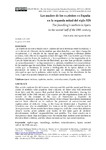Mostrar o rexistro simple do ítem
Las madres de los expósitos en España en la segunda mitad del siglo XIX
| dc.contributor.author | Rodríguez Martín, Ana María | |
| dc.date.accessioned | 2020-12-17T14:05:13Z | |
| dc.date.available | 2020-12-17T14:05:13Z | |
| dc.date.issued | 2019 | |
| dc.identifier.citation | Rodríguez Martín, A.M. (2019). Las madres de los expósitos en España en la segunda mitad del siglo XIX. Atlánticas. Revista Internacional de Estudios Feministas, 4 (1), 240-264. doi: http://dx.doi.org/10.17979/arief.2019.4.1.5232 | es_ES |
| dc.identifier.issn | 2530-2736 | |
| dc.identifier.uri | http://hdl.handle.net/2183/26959 | |
| dc.description.abstract | [Resumen] Los objetivos de este artículo son el análisis de las diferencias entre la realidad y la visión social y literaria de las madres que abandonaban a sus hijos y luego los recuperaban, y el estudio de las causas que las empujaban a efectuar ambas acciones, todo ello en la segunda mitad del siglo XIX. Las fuentes que hemos utilizado son los libros de matrícula y los expedientes de los ingresados en la Casa de Maternidad y Expósitos de Barcelona, que nos han permitido analizar las naturalizaciones y las legitimaciones y, además, establecer las características de las madres que las realizaban. Estos resultados los hemos confrontado con la visión que la literatura, la prensa y bibliografía de la época daban de los abandonos de niños y de las mujeres que los efectuaban. La conclusión principal es que era la pobreza, sobre todo, la causa de los abandonos de los hijos, y que esta acción comportaba el rechazo social hacia sus madres. | es_ES |
| dc.description.abstract | [Abstract] This article analyses the differences between real life and the social and literary vision of mothers who abandon their children, of those who will recovered them later and the causes that pushed them in both directions during the second half of the 19th century. Our sources are the registration book and the records of the inmates in the Casa de Maternidad y Expósitos de Barcelona (Maternity and foundling Home of Barcelona) these above mentioned sources have allowed us to analyze the processes of naturalization and legitimization of children living in the Casa de Maternidad y Expósitos de Barcelona and also to established the features of the mothers who turned to these processes. These results have been compared with the vision that different literary works, press articles and books of the time gave of children abandonment, mothers’ responsibilities and profiles. The main conclusion is that poverty more than dishonour was the reason that pushed some mothers to abandon their children, and this abandonment carried out social rejection. | es_ES |
| dc.language.iso | spa | es_ES |
| dc.publisher | Universidade da Coruña | es_ES |
| dc.relation.uri | https://doi.org/10.17979/arief.2019.4.1.5232 | es_ES |
| dc.rights | Atribución-CompartirIgual 4.0 España | es_ES |
| dc.rights.uri | http://creativecommons.org/licenses/by-sa/4.0/es/ | * |
| dc.subject | Inclusas | es_ES |
| dc.subject | Expósitos | es_ES |
| dc.subject | Madres | es_ES |
| dc.subject | Naturalizaciones | es_ES |
| dc.subject | España | es_ES |
| dc.subject | Siglo XIX | es_ES |
| dc.subject | Orphanages | es_ES |
| dc.subject | Foundlings | es_ES |
| dc.subject | Mothers | es_ES |
| dc.subject | Naturalizations | es_ES |
| dc.subject | Spain | es_ES |
| dc.subject | Second half of the 19th Century | es_ES |
| dc.title | Las madres de los expósitos en España en la segunda mitad del siglo XIX | es_ES |
| dc.title.alternative | The Foundling’s Mothers in Spain in the Second Half of the 19th Century | es_ES |
| dc.type | info:eu-repo/semantics/article | es_ES |
| dc.rights.access | info:eu-repo/semantics/openAccess | es_ES |
| UDC.journalTitle | Atlánticas – Revista Internacional de Estudios Feministas | es_ES |
| UDC.volume | 4 | es_ES |
| UDC.issue | 1 | es_ES |
| UDC.startPage | 240 | es_ES |
| UDC.endPage | 264 | es_ES |
Ficheiros no ítem
Este ítem aparece na(s) seguinte(s) colección(s)
-
REV - ATLÁNTICAS - Vol. 04, 2019 [19]
Número monográfico: La salud en la teoría y las vindicaciones feministas






